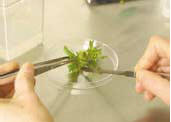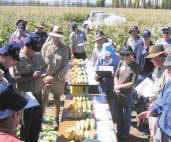|
THE
POWER OF
PASSION !
Grower
Solutions Magazine
Lefroy
Valley Magazine
August
2004
Recently I had the enviable task of
editing the latest edition of our Growers
Solutions magazine, reading through the
pages other Lefroy staff compiled and
submitted. Articles about growers, new
varieties, agronomic hints and advice as
well as opinions on our industry, the good
the bad and sometimes the ugly.
It's enlightening looking back over the last
5 -10 years of the vegetable industry
and seeing just how much some areas
have changed. As a grower, think about
how many varieties you use now,
compared to that of 10 or even 5 years
ago. (Not many). Or were you even
growing the same crops you grow today?
Things like baby leaf salad mixes and
watermelons without seeds were virtually
unknown. Now many growers make their
living from producing those crops. What
variety do you think you will be growing
in another 10 years? It's unlikely to be the
same variety as today, and maybe a
completely different crop. Who knows
maybe there will even be rockmelons that
have consistent flavour and sweetness?
Oh yeah, we are releasing those now!
Many growers are now becoming more
aware that the most critical input to their
farming success going forward, is not the
type of fertiliser they use, or the
chemicals they have available to them
although those tools are important.

Plant breeding
As a grower your ability to produce the
best crop possible, starts with identifying
and selecting the best genetics (seed) to
put in the ground on your farm. In
Australia we now have large areas of
vegetable production land, which has
pests or diseases present, which without
the development of new genetically resistant varieties would no longer be
suitable for production of some crops.
Fusarium race 3 in some areas in north
Queensland will kill tomato plants
without resistance. Tomato Spotted Wilt
Virus is now a major threat to West
Australian tomato growers, White blister
on brassicas in Victoria, and pests like the
Nasanova aphid in New Zealand, and
more recently Australia, has caused major
problems with lettuce.
The most effective and inexpensive way
of combating these issues affecting
growers and will continue to affect
growers right across Australia and New
Zealand, is by developing genetic
resistance into the varieties you plant!
The same goes for important features like
appearance, taste, yield, and nutritional
value. Talk to people in the rockmelon
industry and they will tell you, consumer
confidence and satisfaction when it comes
to flavour and sweetness in rockmelons and honey dews is very low. Consumers
buy these fruit to get a sweet treat, but
many are disappointed to the extent they
choose to buy something else next time.
Unfortunately that's negative passion. |

Taste testing watermelons
So what about the positive passion. I
know growers are passionate about what
they do and most strive to turn out the
best product they can, after all it's their
name on the carton that gets sent around
the country, "the ultimate judgement day".
When it comes to consumers, believe it or
not they are passionate about the
vegetables they eat. Particularly being in
the vegetable industry, many people I
meet often ask me why don't certain
vegetables taste like they use to.
I know the seed breeding companies and
their plant breeders are passionate
because I see it everytime I visit them or
talk to them. They want to be the one
who breeds the next new variety that
really makes it in the market.
I know our product development, sales,
and support staff are passionate,
because I get to see the excitement on their face when they come in after
working through a trial plot alongside a
grower and have discovered something
better, or a little special, that will give the
grower that little bit of an edge.

Evaluating corn trials
What really gives us a buzz as seedsmen is being at
the cutting edge of delivering new genetics to Australian growers and
knowing that there is something special, new, or better about to be
uncovered. It's a bit like digging for treasure.
Another thing that's exciting for so many of our
field staff is the way more growers are becoming actively involved in
finding genetic improvements that give them the edge. These are
growers who understand the need to develop better genetics to support
their future.
These are the really passionate growers who are not
only demanding new varieties to meet their changing needs, to keep
them ahead in the market, but are passionate enough to do something
about it and get involved along side us, give feedback, and work
together to achieve that goal.
Coming together is a beginning,
Keeping together is progress,
Working together is success.
Grower
Solutions Magazine
Lefroy
Valley Magazine
August
2004 |